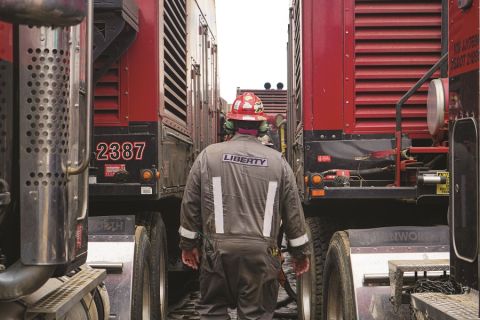Natural gas has many of the elements that led OPEC to a strong enough world position that it could dictate oil prices, within a range. Industry experts have pondered the potential for a cartel that would have a similar impact on emerging world-linked gas markets. The answer to that question: not yet. Abdullah bin Hamad Al-Attiyah, minister of energy and industry for the state of Qatar, probably has the strongest argument against a cartel. Al-Attiyah spoke via satellite at a gas geopolitics conference sponsored by the James A. Baker III Institute for Public Policy at Rice University in Houston. He said, "A cartel of gas? I don't believe it." Gas, he explained is a long-term market with 25-year contracts. It isn't as volatile as oil. Baker, a former U.S. secretary of state, replied, "I'm pleased to hear you say that, because if you're not part of it, it probably won't work." That wasn't the end of the conversation. The cartel question hung around the fringes of the gathering. Gas is the preferred fuel in many countries, particularly for electricity generation. It made up 17% of world energy demand in 1970, but that number will rise to 28% by 2030, the International Energy Agency (IEA) calculates. Gas demand will double between 2000 and 2030 with a growth rate of 2.4% a year. David Victor, director of the program on energy and sustainable development at Stanford University and a co-host of the conference at Rice University, noted that the top seven gas exporters control 79% of the market. At the same time, "Canada, Norway, and The Netherlands are not likely to join." He added, "There are a large number of fringe suppliers and policy decisions that would make a cartel difficult." Amy Myers Jaffe, energy studies and research coordinator at Rice University, reinforced that position. The group looked at gas in the framework of OPEC in a dominant-producer model with a group of producing countries that made up a certain percentage of supply. The group looked at reserves and expansion, and security implications for distribution of gas. Contrary to the common perception that the gas market is so dispersed that it can't be controlled by a cartel, gas reserves are more concentrated than oil reserves, she said. Countries able to export gas also are highly concentrated, but with high volumes of production from countries such as Norway and the U.S., the effectiveness of a proposed cartel would be blunted. Russia holds 30.5% of world gas reserves. Add Iran and the concentration grows to 46%. In contrast, the two largest owners of oil reserves-Saudi Arabia and Iran-have 36% of world gas reserves. The conditions for an effective cartel, Jaffe said, dictate that the group must control a large share of the market, must agree on production quotas of capacity controls, must prevent cheating among members, must have markets with inelastic demand, must have low elasticity of supply from non-members; and should have a small number of members. There is a concentration of reserves and exports, she said, but much of those supplies are underdeveloped. With many smaller sources of supply, it's hard to influence the market, and wider development of an international market for gas will create many more supply sources. Gas exporters have little power at present, and the world has too many of them to exercise efficient control in the immediate future. The long-run picture may be different, Jaffe added. The world can get tremendous amounts of gas by pipeline-to Europe and Asia-from Russia and tremendous amounts of liquefied natural gas (LNG) from the Middle East. Russia will dominate its areas, because pipeline gas is cheaper than LNG. The world will become more dependent on a few sources of gas after 2030, she said, but consuming nations can reduce the power of exporters by promoting competition among energy sources, by liberalizing domestic energy sectors and by developing technology that will facilitate fuel switching. They also can improve energy efficiency. Still, if a large exporter like Russia decided to withhold gas from the market, user countries would be forced to replace those natural gas supplies with higher-priced gas from other sources, and gas prices around the world would likely rise. That strategy would cost Russia market share, just as it has cost Saudi Arabia market share in oil. -Don Lyle
Recommended Reading
Oil and Gas Chain Reaction: E&P M&A Begets OFS Consolidation
2024-04-26 - Record-breaking E&P consolidation is rippling into oilfield services, with much more M&A on the way.
Baker Hughes Awarded Saudi Pipeline Technology Contract
2024-04-23 - Baker Hughes will supply centrifugal compressors for Saudi Arabia’s new pipeline system, which aims to increase gas distribution across the kingdom and reduce carbon emissions
SLB’s ChampionX Acquisition Key to Production Recovery Market
2024-04-21 - During a quarterly earnings call, SLB CEO Olivier Le Peuch highlighted the production recovery market as a key part of the company’s growth strategy.
Baker Hughes Hikes Quarterly Dividend
2024-04-25 - Baker Hughes Co. increased its quarterly dividend by 11% year-over-year.
Bobby Tudor on Capital Access and Oil, Gas Participation in the Energy Transition
2024-04-05 - Bobby Tudor, the founder and CEO of Artemis Energy Partners, says while public companies are generating cash, private equity firms in the upstream business are facing more difficulties raising new funds, in this Hart Energy Exclusive interview.





